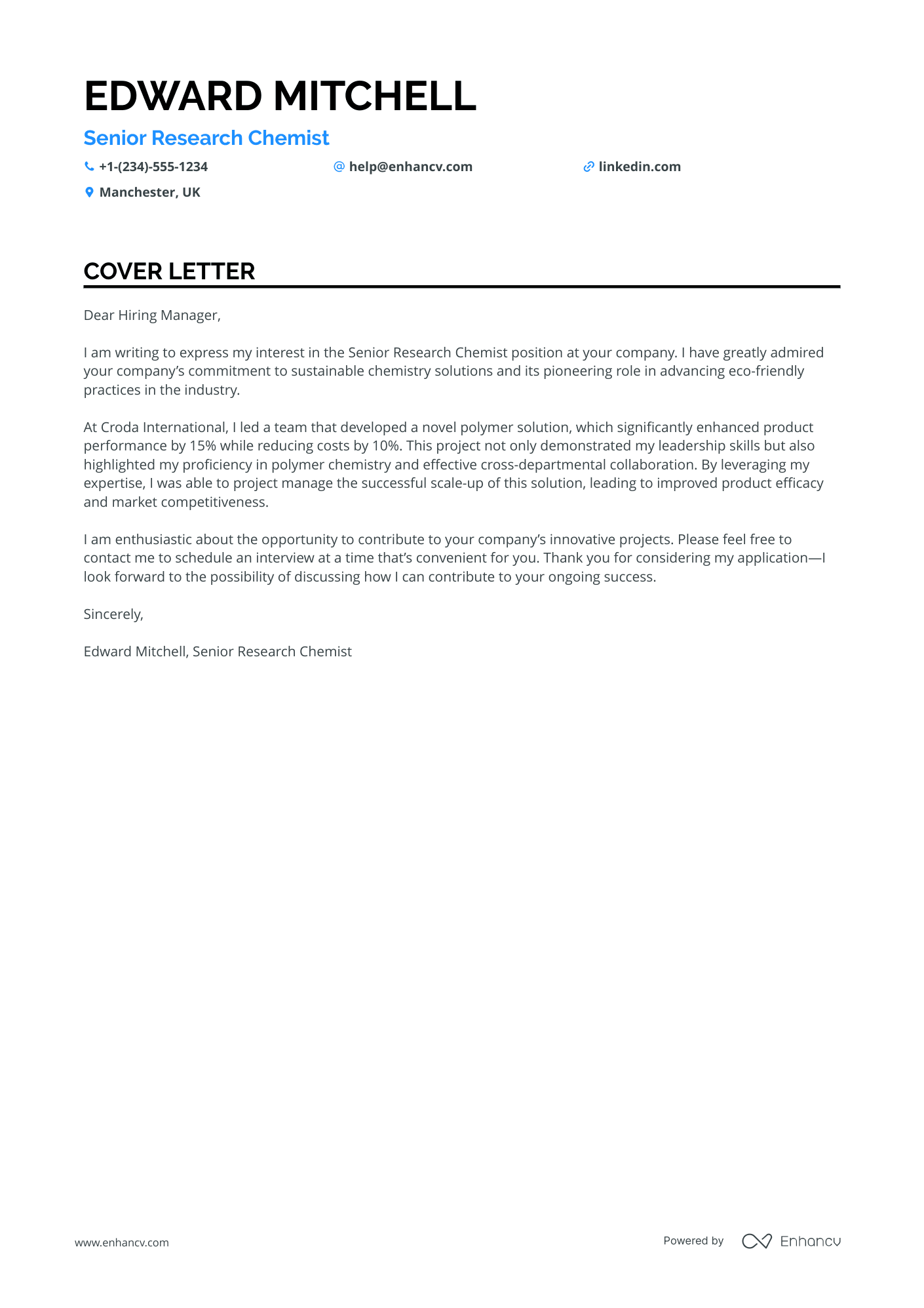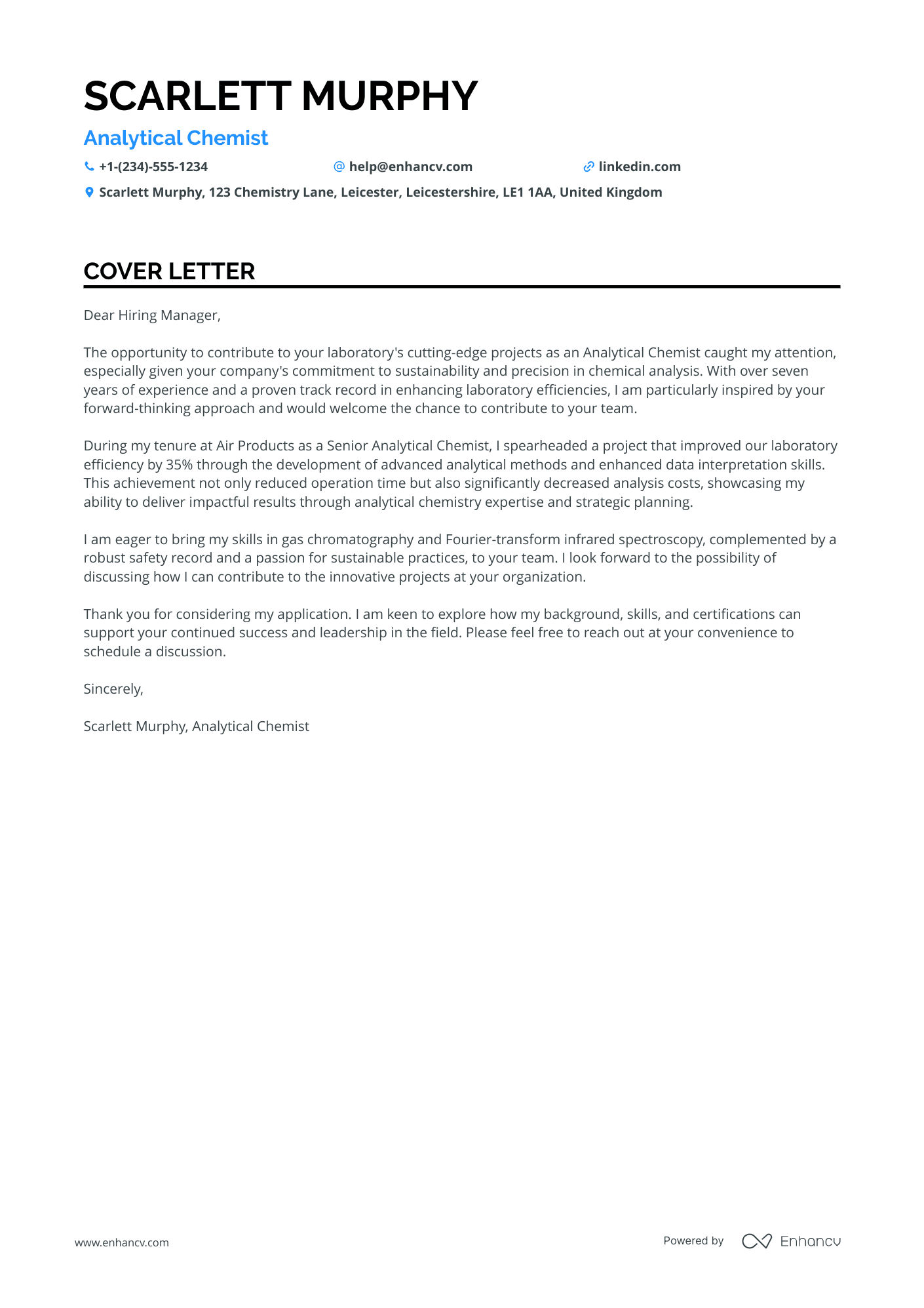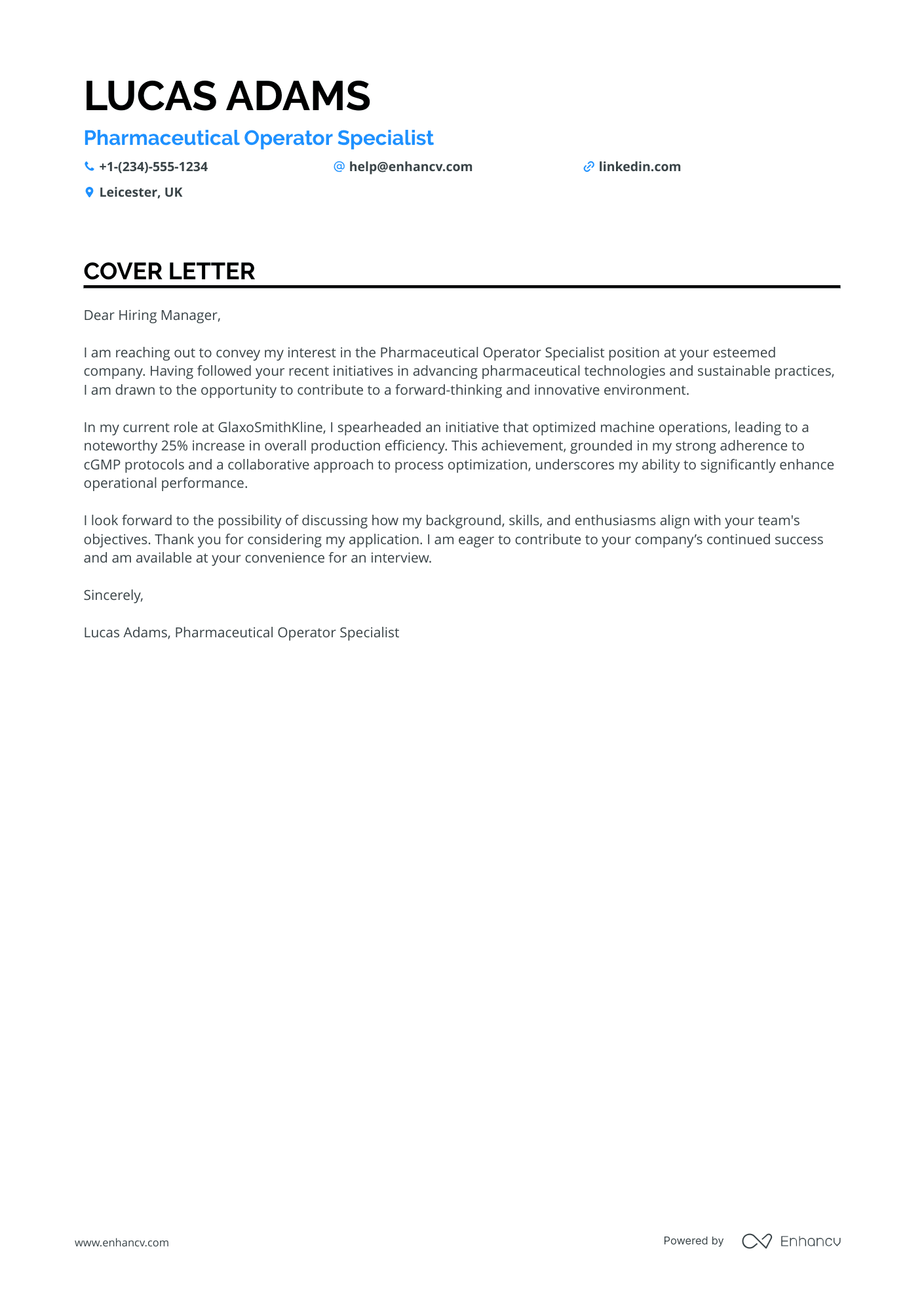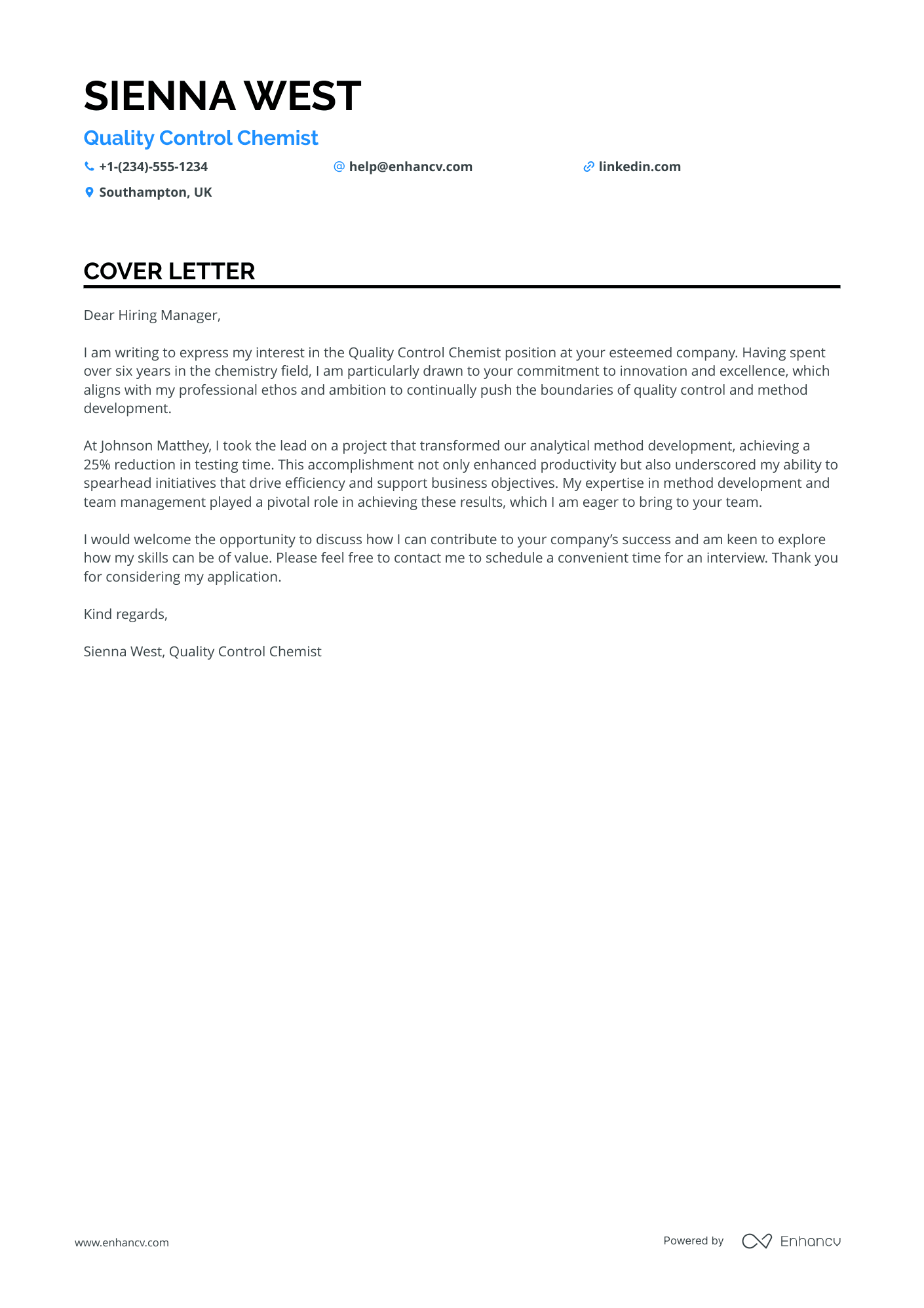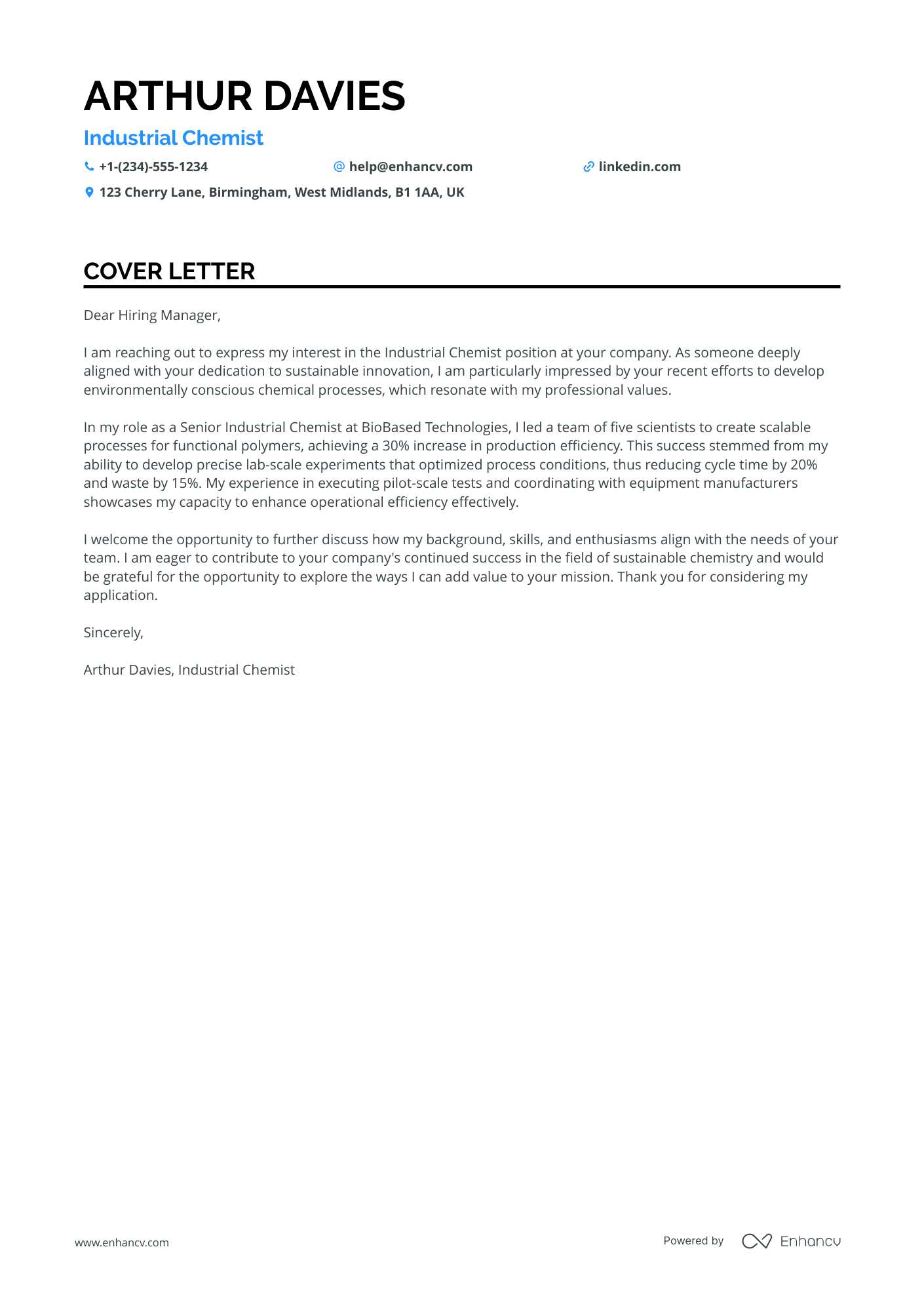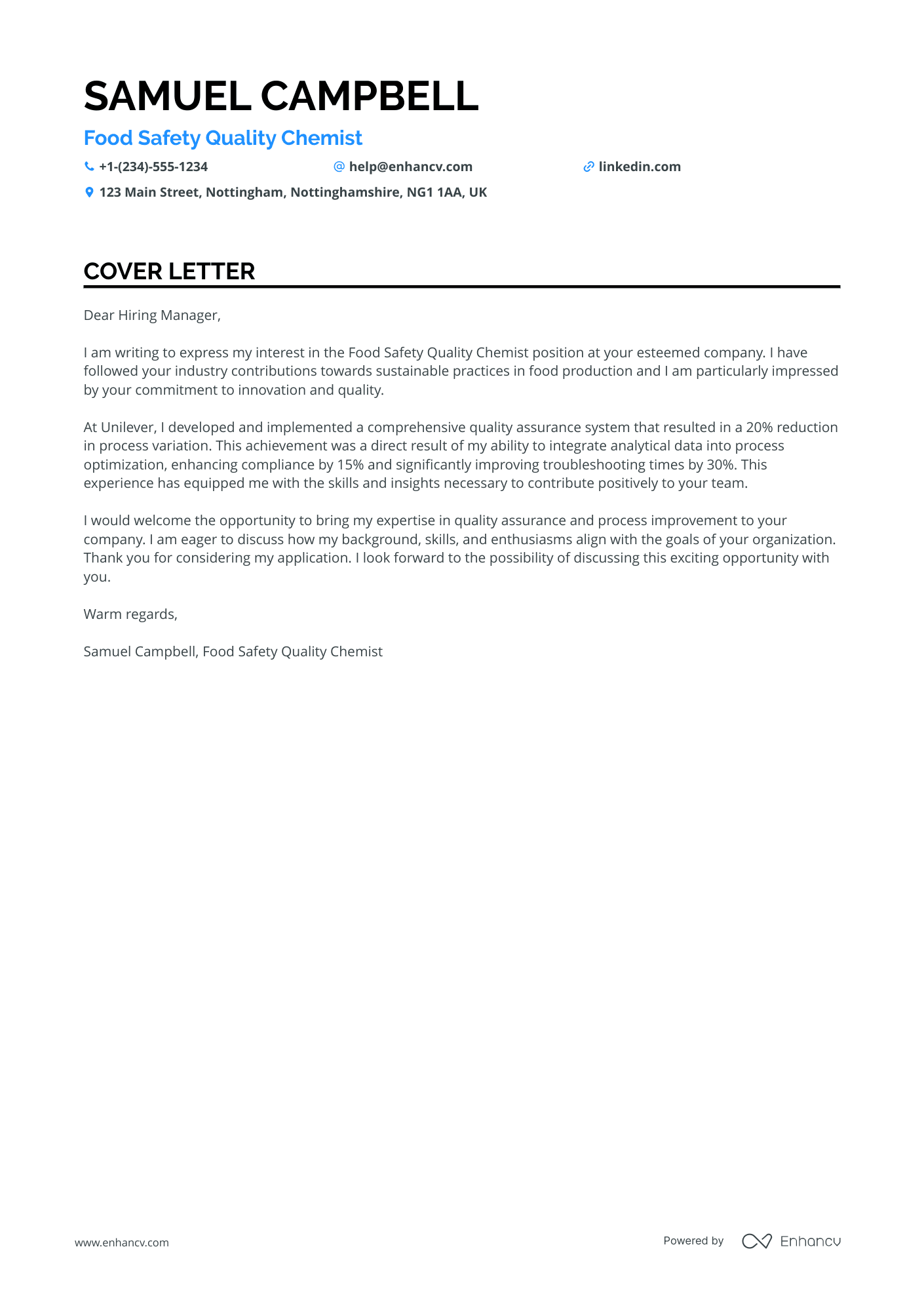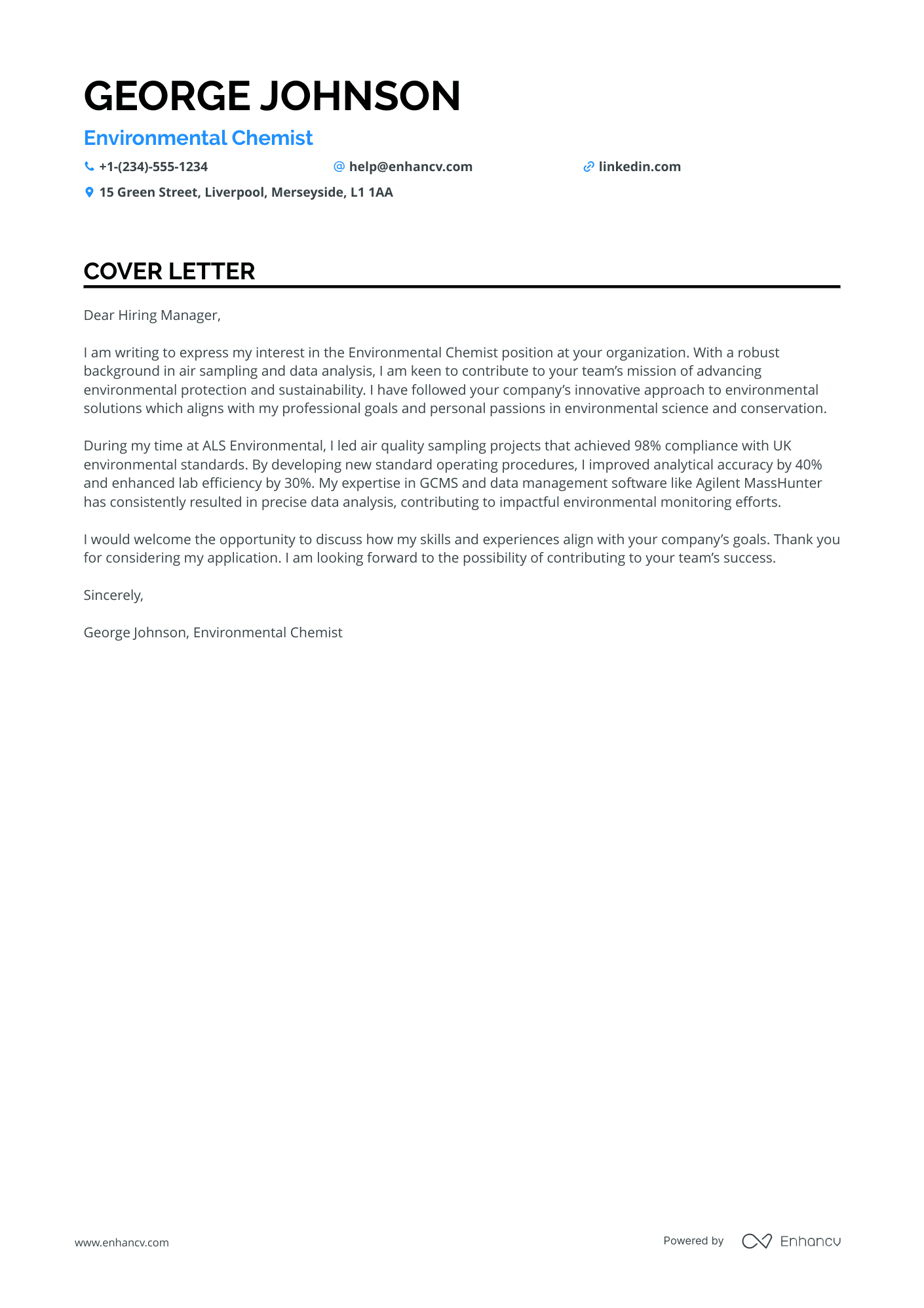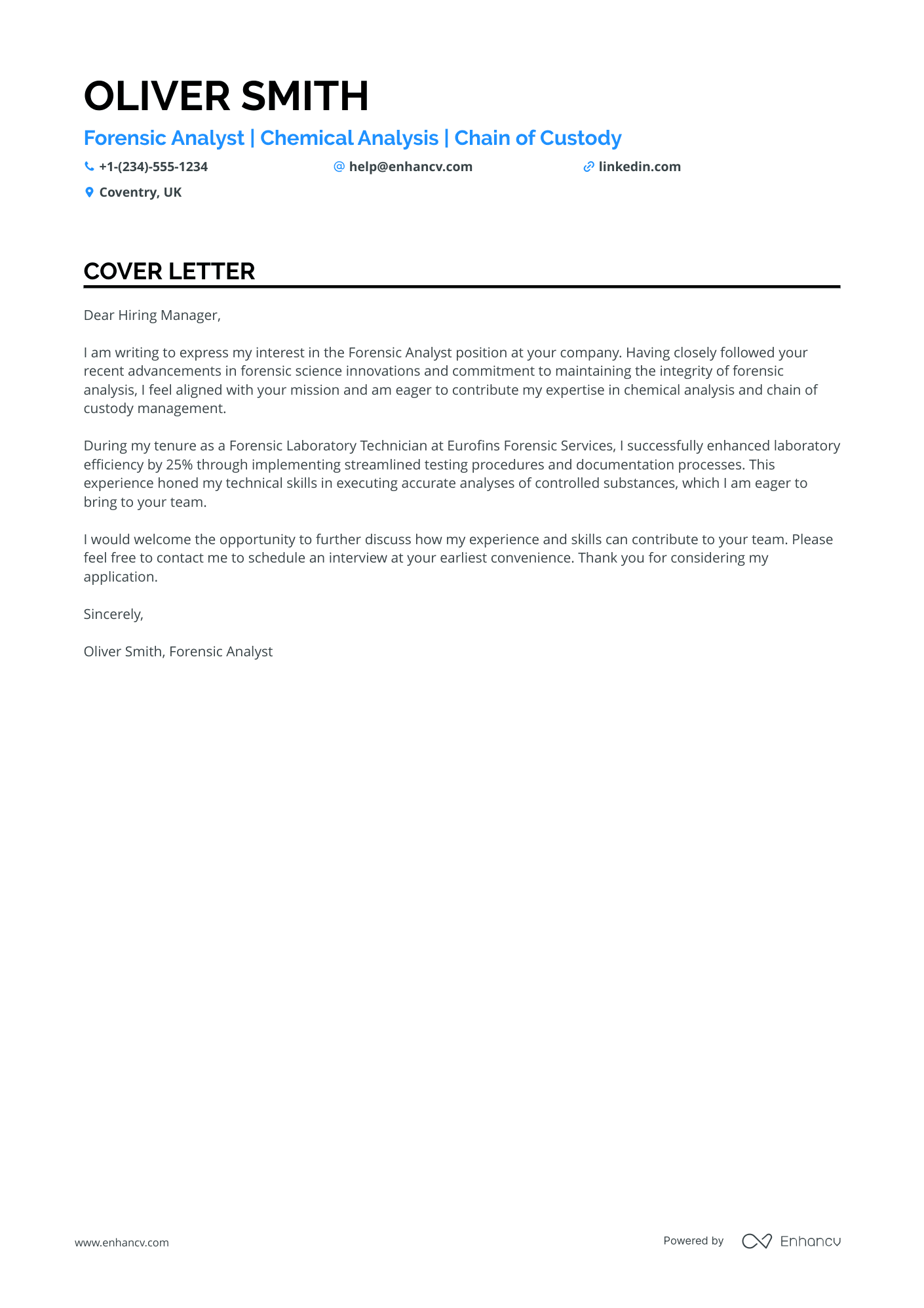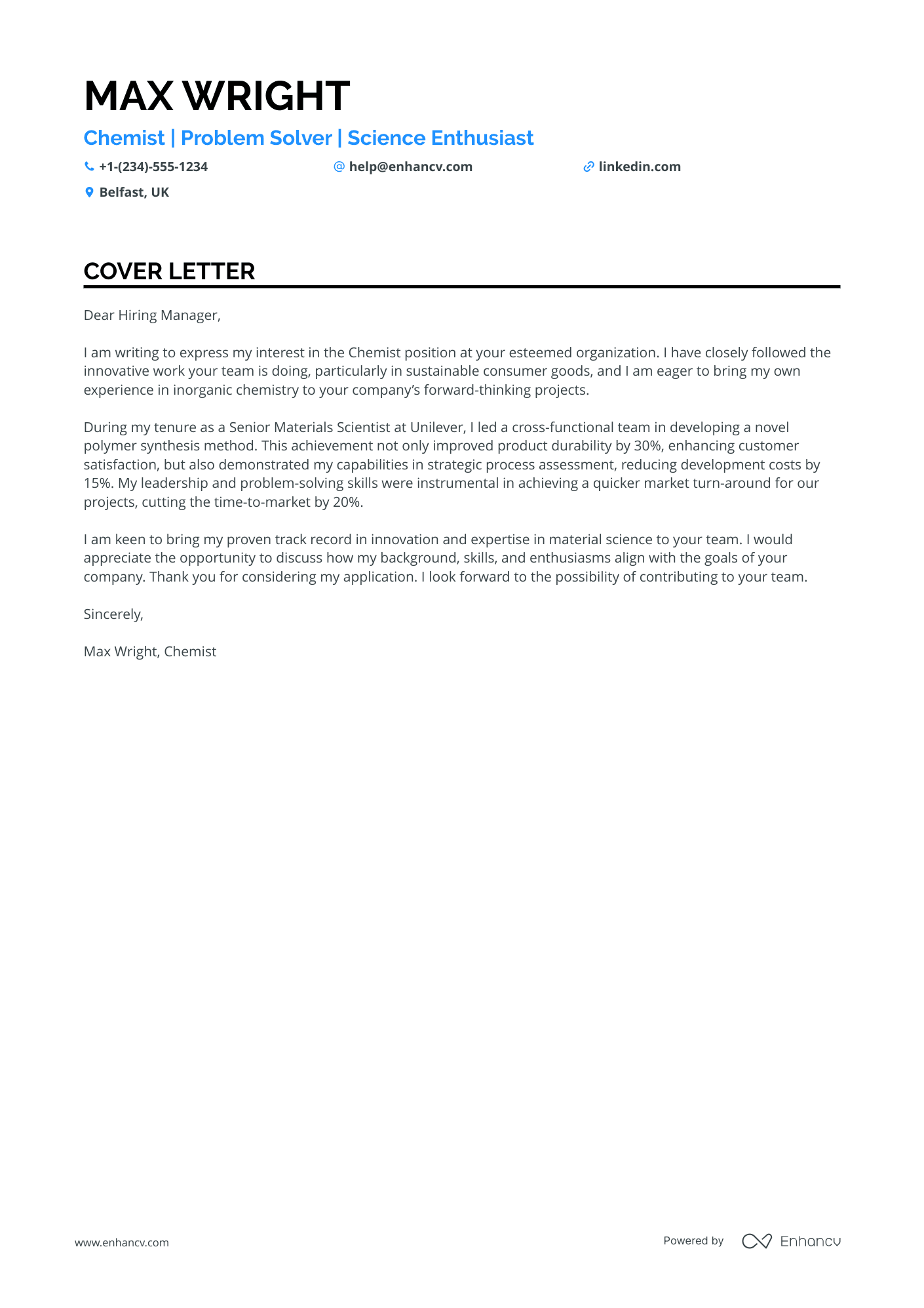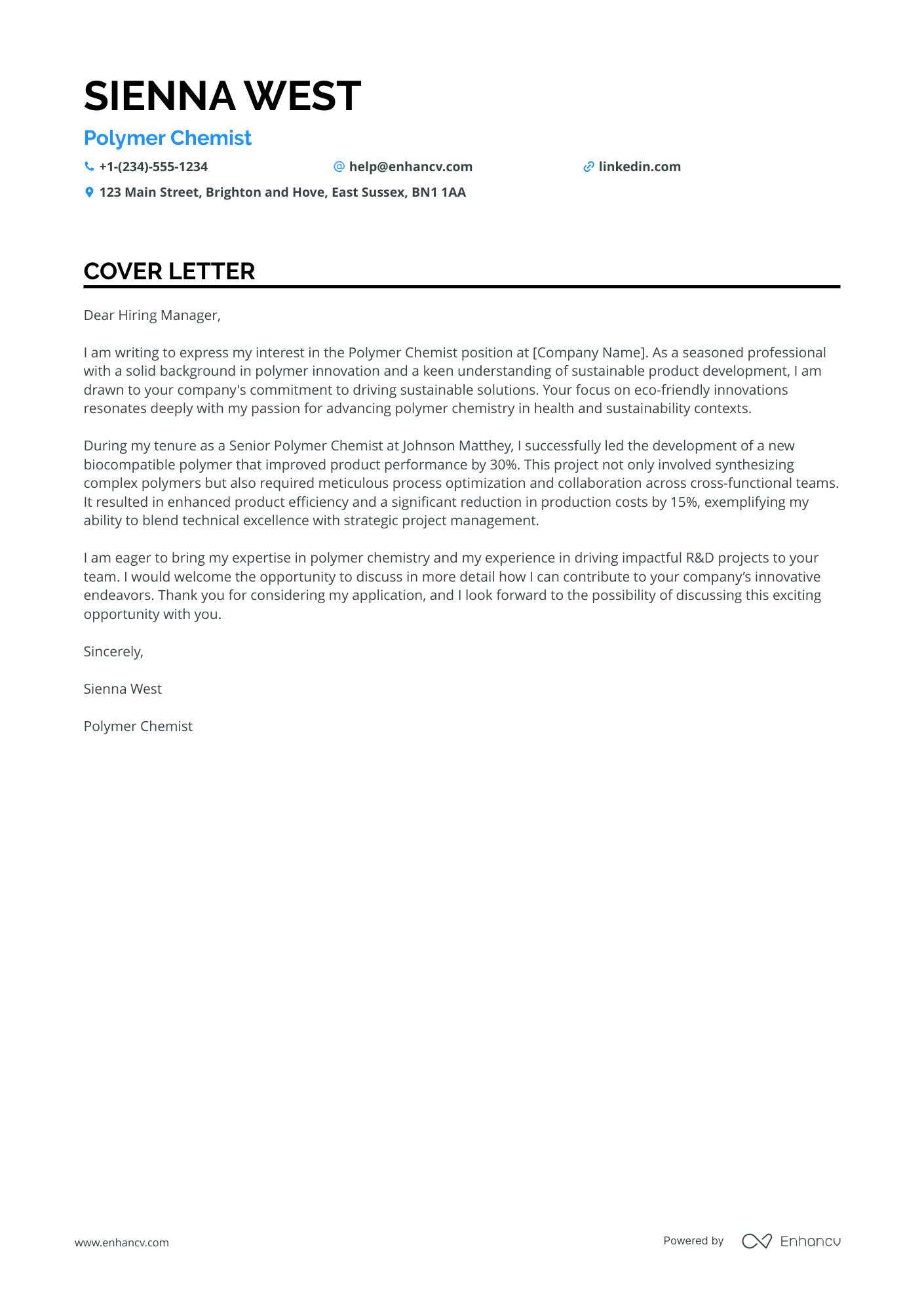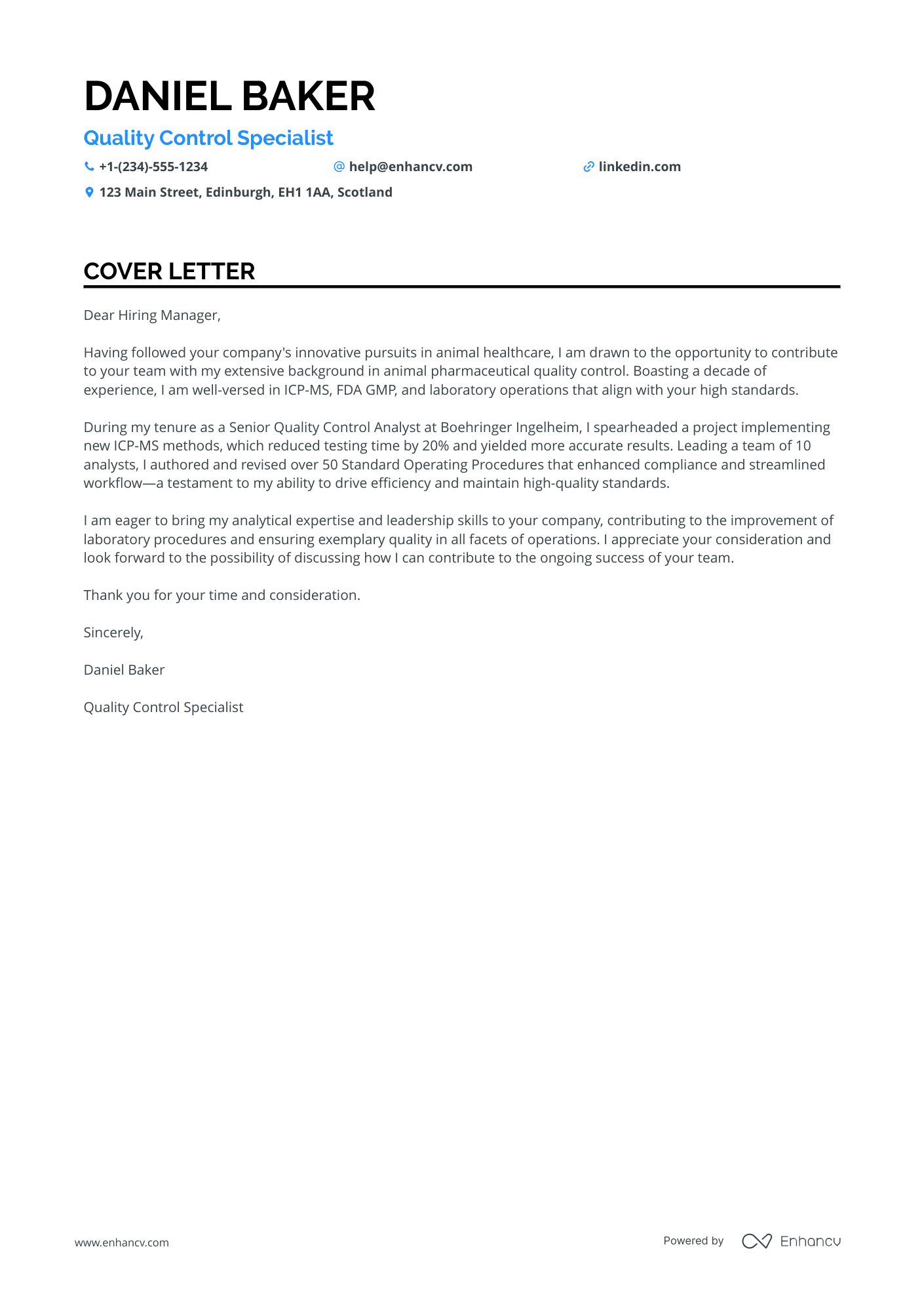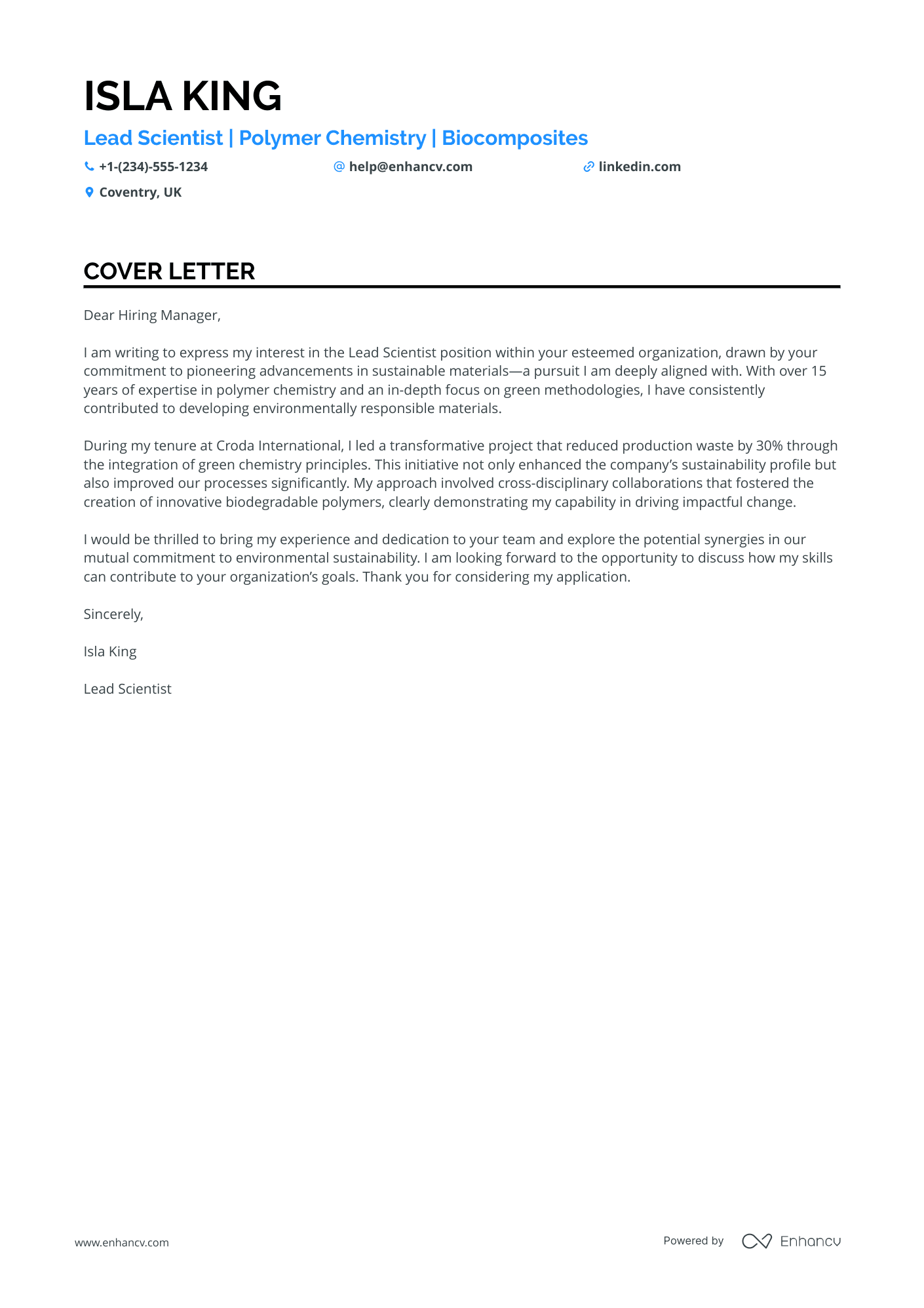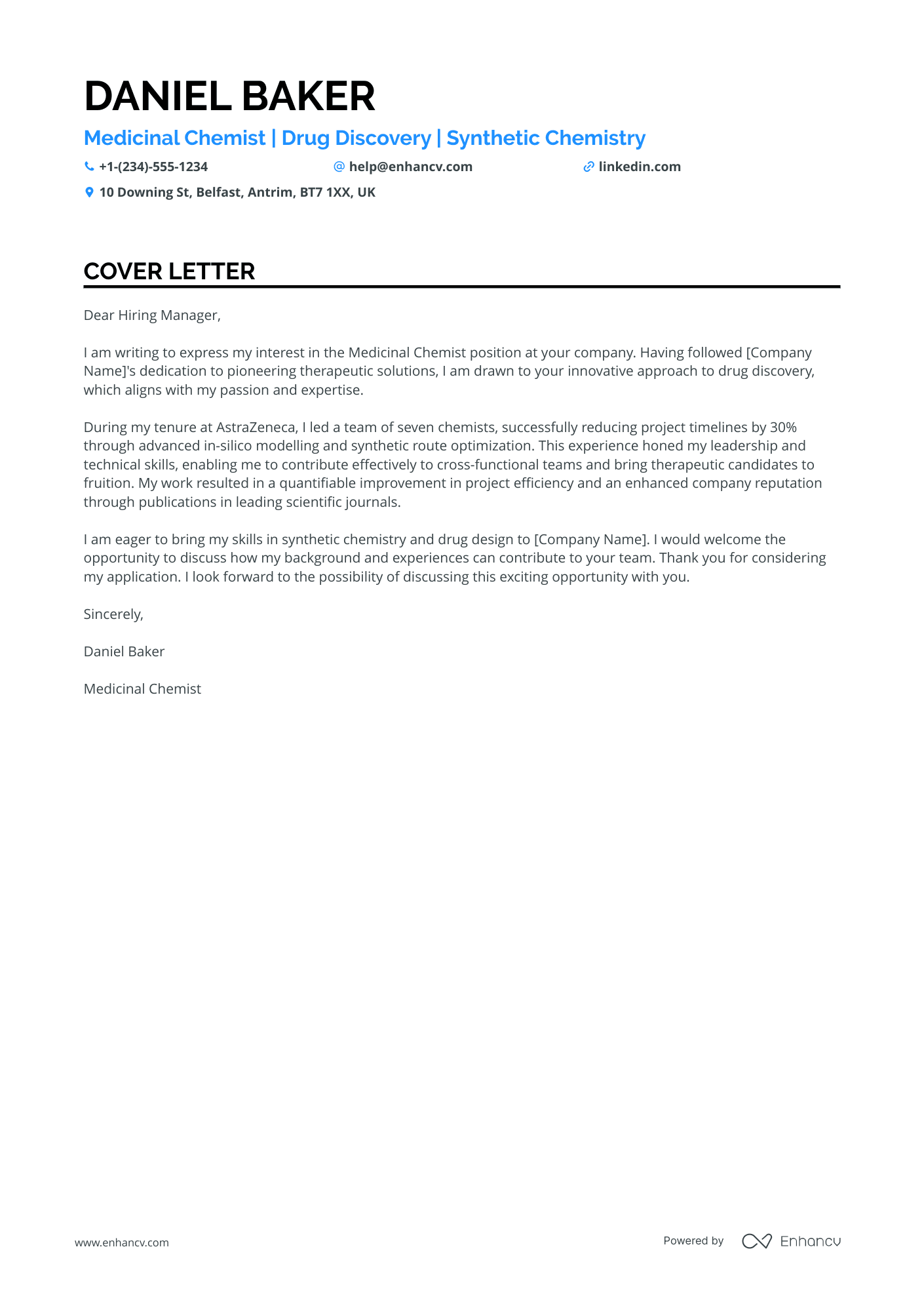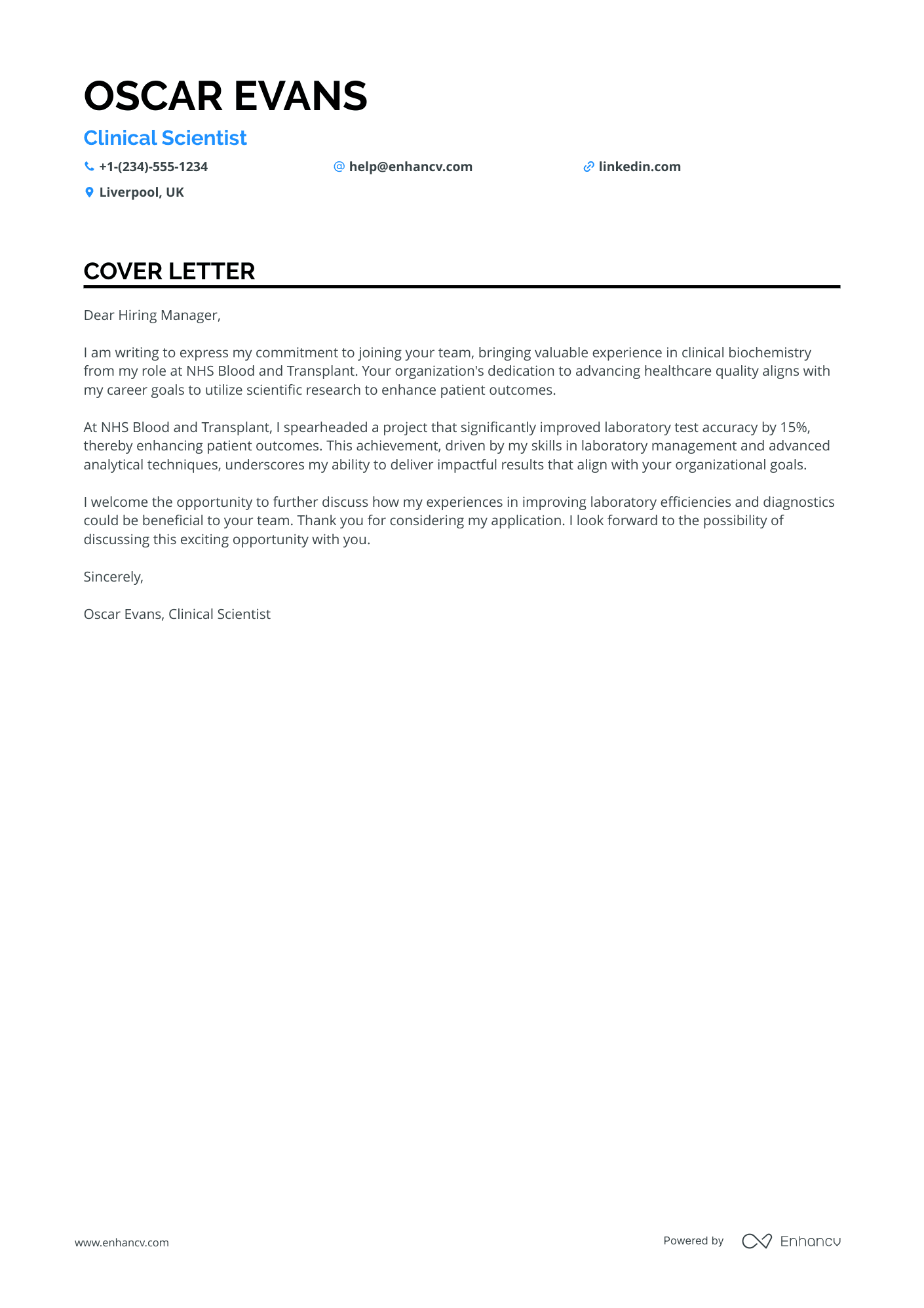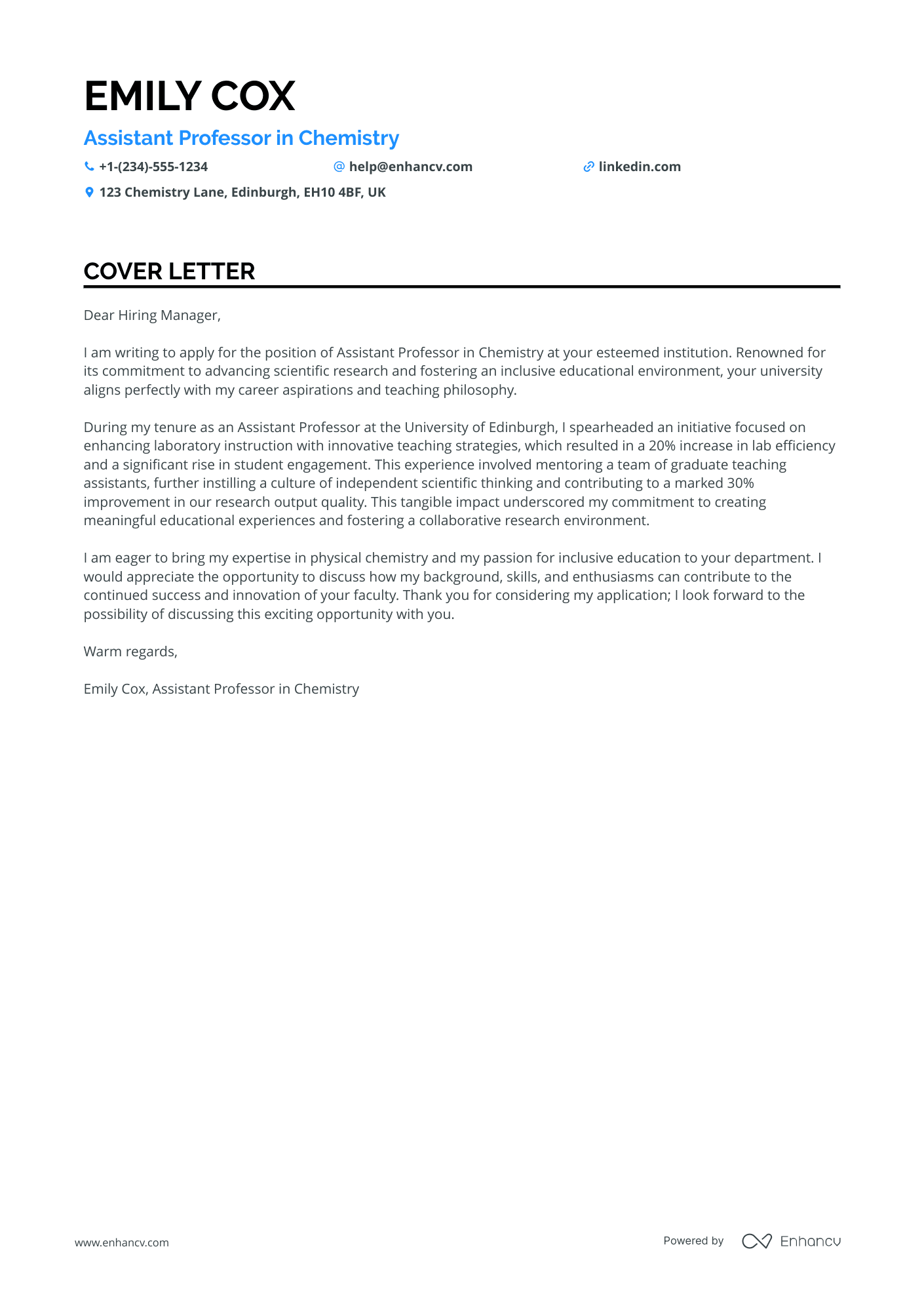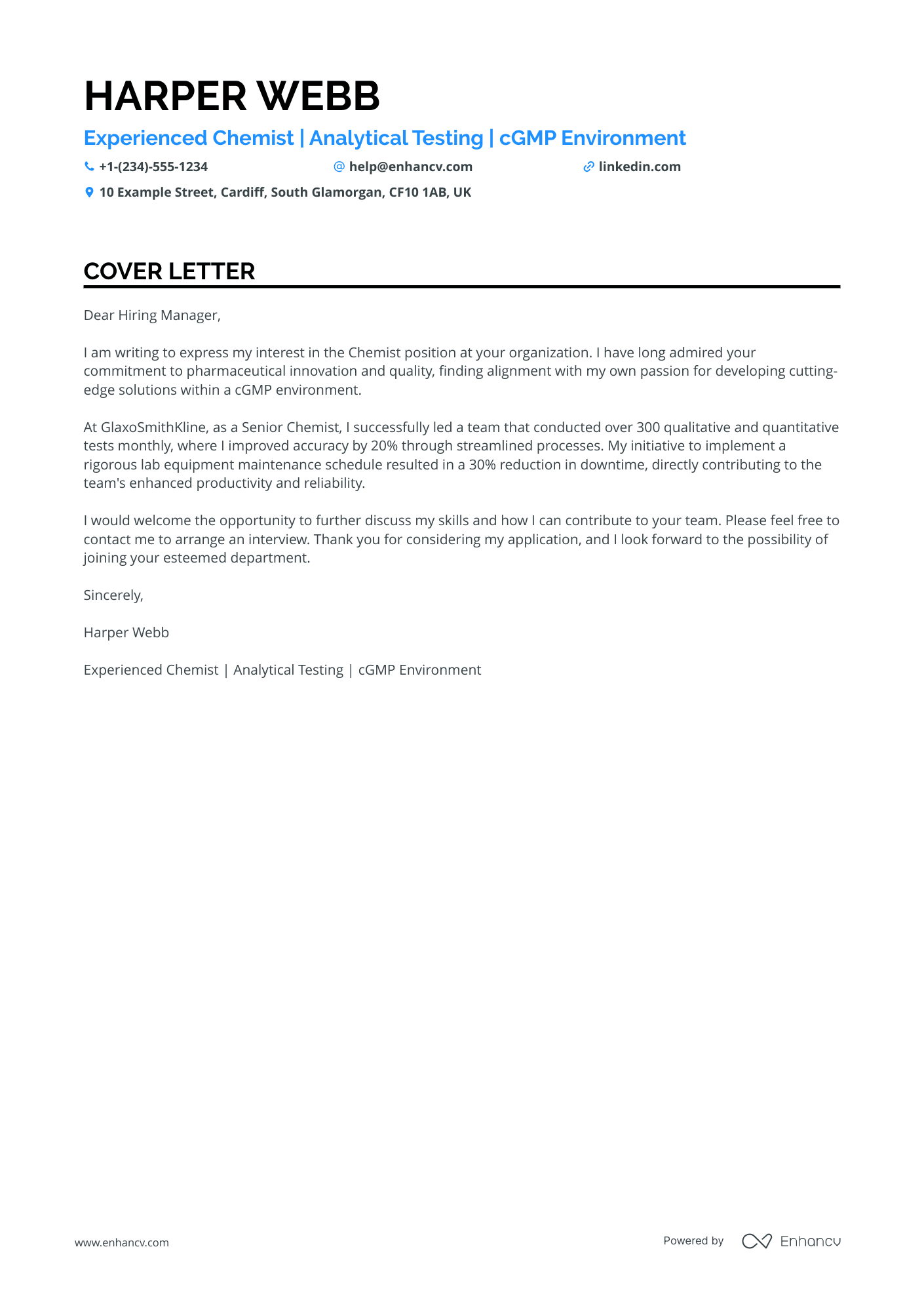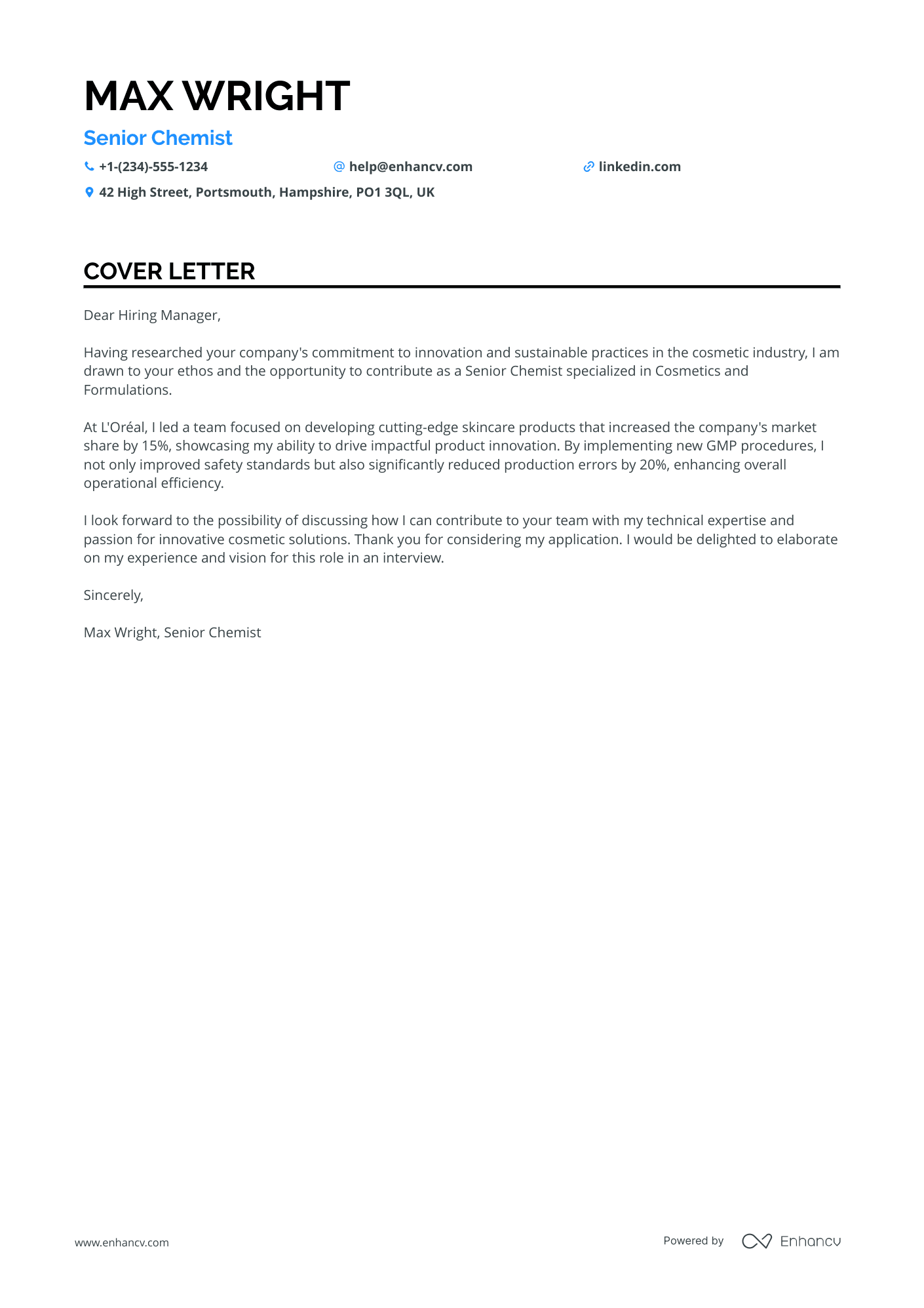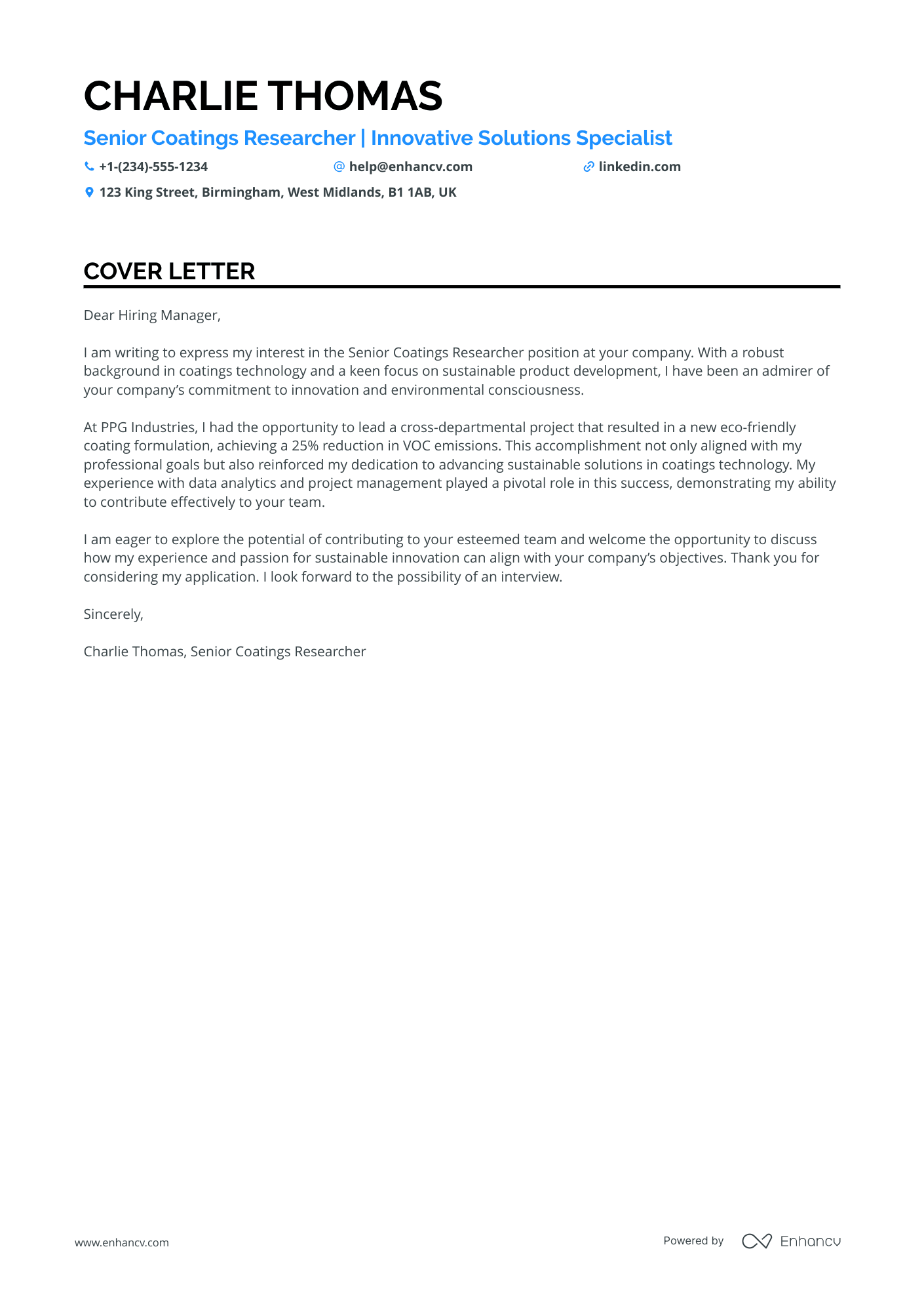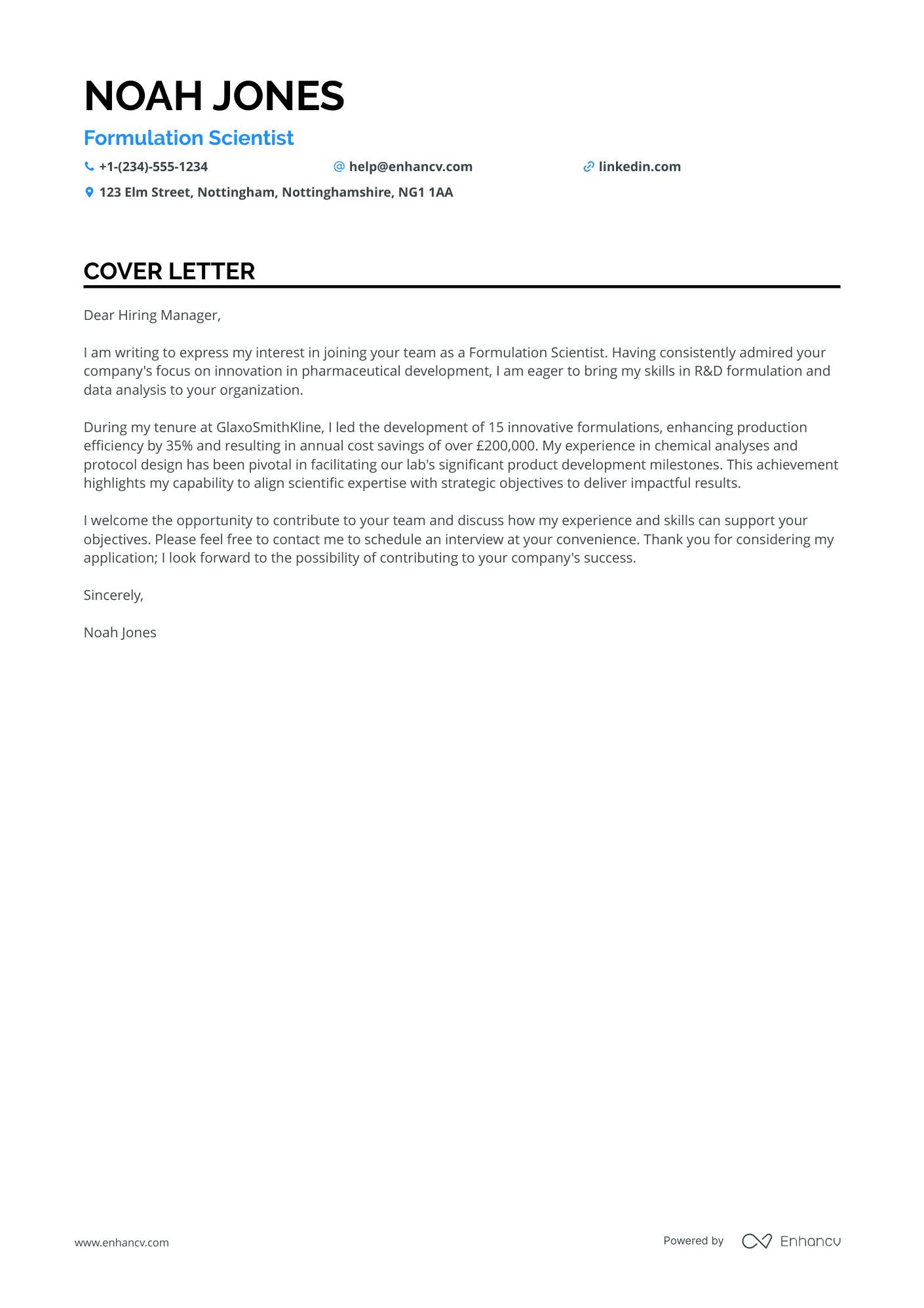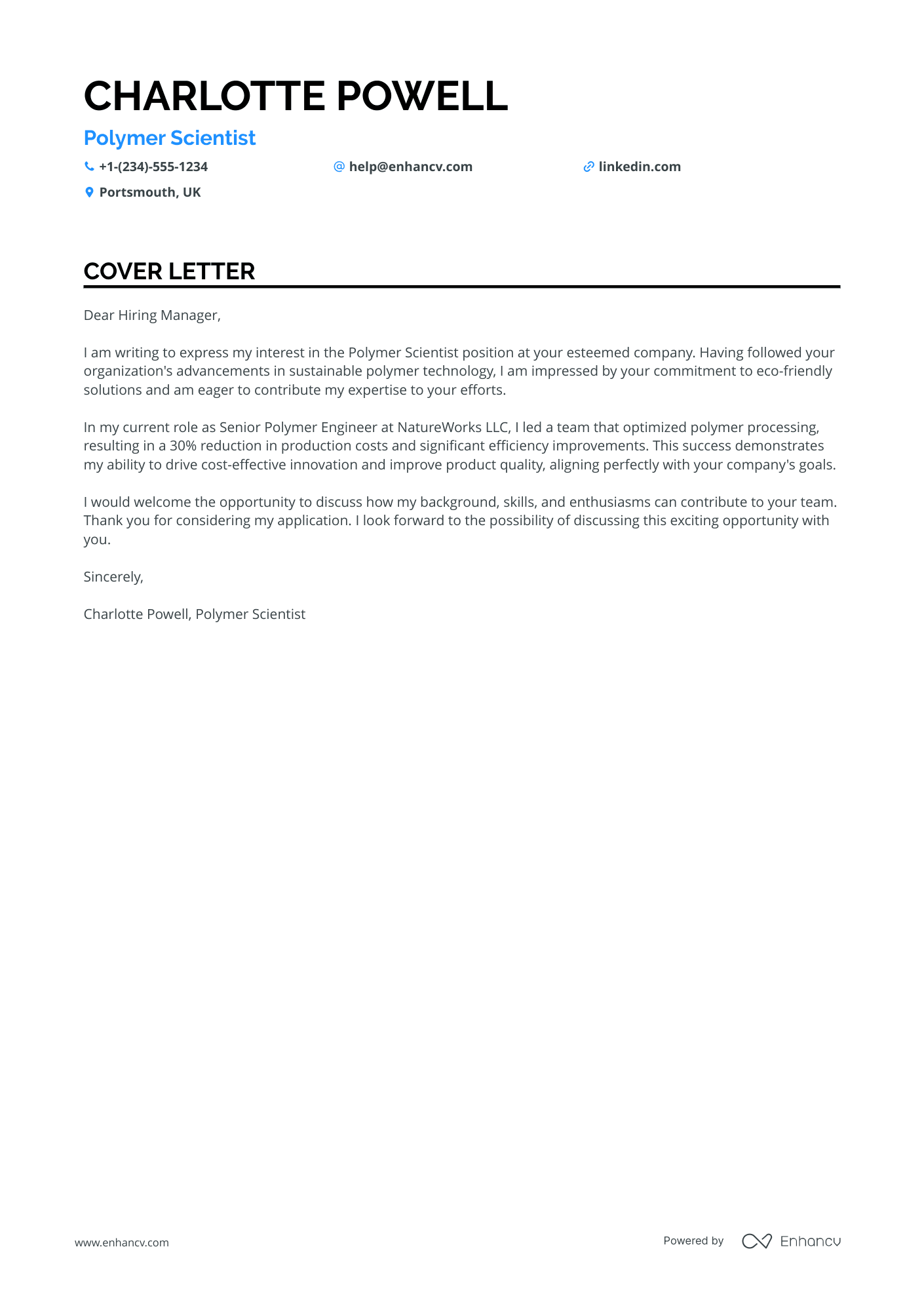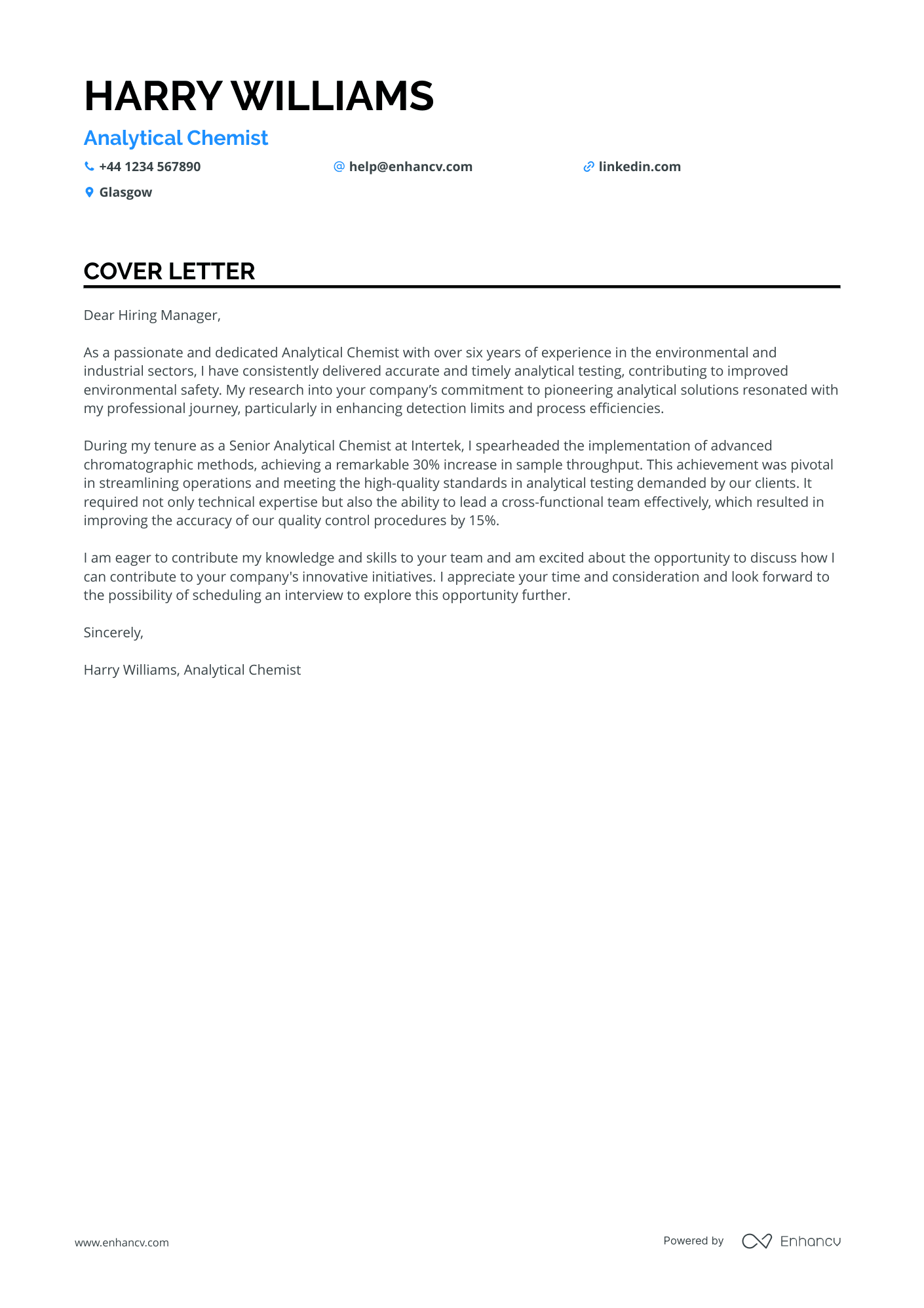Writing a strong cover letter requires close attention to detail, from the tone of voice to avoiding those pesky spelling or grammar mistakes.
Overlooking similar small details can weaken your application.
Many candidates also struggle with how to address the letter, often opting for 'Dear Sir or Madam' when they can’t find the correct contact. This can make your cover letter feel impersonal.
In this guide, we’ll show you how to perfect these crucial elements, ensuring your cover letter is polished and professional without relying on clichés.
Cover letter examples for chemist
By Experience
Senior Research Chemist
- Specificity in Experience: The cover letter highlights Edward Mitchell's extensive industrial synthesis experience by providing concrete examples of past projects and quantifiable achievements, such as improving product performance and reducing costs.
- Relevance of Skills: The letter lists relevant skills such as "Project Management" and "Regulatory Compliance" which are essential for a Senior Research Chemist in ensuring projects are managed efficiently and meet industry standards.
- Demonstrated Leadership: It emphasizes leadership abilities through roles where Edward led teams and cross-departmental projects, showcasing the capability to manage and deliver complex projects successfully.
- Industry Recognition: Achievements like authoring research articles in leading journals and receiving significant peer citations highlight Edward's credibility and recognition within the organic chemistry community.
By Role
Analytical Chemist
- Emphasising certifications such as "Advanced Gas Chromatography Techniques" and "FTIR Spectroscopy Applications" to underscore expertise in key analytical methods critical for an Analytical Chemist role.
- Highlighting substantial achievements in process optimisation, such as a 50% decrease in analytical turnaround time, which can directly appeal to employers seeking efficiency improvements in laboratory settings.
- Showcasing leadership in safety by detailing a 65% reduction in incident rates and compliance with ISO17025, demonstrating a commitment to maintaining stringent safety standards.
- Incorporating quantified accomplishments like a 30% reduction in testing errors and increased laboratory efficiency, which provide concrete evidence of technical aptitude and problem-solving skills.
Chemist in Pharmaceutical Development
- Highlight industry-specific experience: Emphasise your proficiency in cGMP protocols and experience in pharmaceutical operations, especially your achievements in improving production efficiency and safety compliance.
- Showcase leadership and training skills: Mention your role in training team members and optimising team capability, as well as your contributions towards reducing onboarding times.
- Emphasise your problem-solving ability: Detail your proactive approach towards process optimisation and innovation in chemical synthesis, contributing directly to increased yield and operational efficiency.
- Mention certifications relevant to the role: Include your certifications in Advanced Process Safety and Effective Chemical Plant Operations to highlight your commitment to professional development and specialised knowledge in chemical engineering.
Quality Control Chemist
- Emphasise on achievements: Highlighting quantifiable achievements such as a 25% reduction in testing time and a 30% increase in monthly output showcases the candidate's ability to drive efficiency and productivity, which is critical for a Quality Control Chemist.
- Method development expertise: Citing specific experiences in method development and SOP optimisation reflects the candidate's aptitude for enhancing laboratory procedures, a vital skill for maintaining high-quality standards in chemical analysis.
- Root cause analysis (RCA) proficiency: Detailing the execution and training in RCA demonstrates problem-solving capabilities and the ability to reduce rework, which are essential for improving quality assurance processes.
- Education and certifications: Listing relevant education such as an MSc in Chemistry, alongside certifications like "Advanced Quality Control in Chemistry" from the Royal Society of Chemistry, underlines the candidate's technical expertise and commitment to continuous professional development.
Industrial Chemist
- Specific Achievements: The cover letter effectively highlights specific achievements such as increasing production efficiency by 30% and reducing workplace incidents by 50%, showcasing the candidate's impact in previous roles.
- Relevant Experience: It emphasises relevant experience in process development and scaleup, crucial for an Industrial Chemist role, demonstrating the ability to transition from lab-scale to manufacturing scale.
- Proven Leadership: The cover letter highlights leadership skills by mentioning experience in leading a team and mentoring junior chemists, which is valuable for fostering a collaborative team environment.
- Focus on Sustainability: Emphasising enthusiasm for sustainable product development aligns well with current industry trends and potential employer values in the chemical industry.
Chemist in Food Science
- Specialised Skills: Emphasising skills such as Quality Assurance, Food Safety, and Analytical Testing is critical for the role of a Food Safety Quality Chemist, as these are core requirements for ensuring the quality and safety of food products.
- Quantifiable Achievements: Highlighting accomplishments with specific metrics, such as a 20% reduction in process variation or a 25% decrease in waste, provides concrete evidence of capabilities and impact in previous roles, making the application more compelling.
- Relevant Certifications: Mentioning the HACCP Level 3 certification is crucial, as it demonstrates a recognised level of expertise in hazard analysis and critical control points, a fundamental aspect of food safety management.
- Passion for Industry Trends: Expressing a passion for Sustainable Food Production shows personal motivation and alignment with contemporary industry concerns, which can be attractive to employers focused on sustainability initiatives.
Chemist in Environmental Science
- Relevant Expertise and Experience: The cover letter effectively highlights George Johnson's direct experience and expertise in air sampling and analysis, showcasing his leadership in projects that enhanced lab efficiency by improving methodologies and compliance with environmental standards.
- Specific Skillset: It emphasises his proficiency with key analytical tools and software, such as GCMS, Agilent MassHunter, and others, which are crucial for the role of an Environmental Chemist.
- Demonstrated Problem Solving and Innovation: The letter illustrates his ability to solve complex problems and innovate, such as developing a new sampling methodology that reduced analysis time and improved equipment maintenance protocols to decrease downtime.
- Continuous Professional Development: Lists relevant certifications and courses, such as the "Advanced Air Quality Monitoring" and "GCMS: Theory and Practice," indicating a commitment to continuous learning and keeping up-to-date with the latest in the field.
Forensic Chemist
- Emphasising Efficiency Improvements: Highlighting the achievement of enhancing laboratory efficiency by 25% through streamlined procedures is crucial for showcasing one's ability to improve operations in forensic science environments.
- Detailing Collaboration with Law Enforcement: Mentioning successful collaborations on over 50 cases provides evidence of effective teamwork with law enforcement, an important aspect for credibility in forensic roles.
- Highlighting Specific Technical Skills: Skills such as implementing new calibration techniques and maintaining chain of custody are vital in forensic analysis roles and demonstrate technical proficiency.
- Showcasing Advanced Education in Forensic Science: A Master's degree in Forensic Science from a reputable university underscores the applicant's specialised knowledge and commitment to the field.
Chemist in Material Science
- The candidate effectively highlights their extensive experience in consumer goods and expertise in inorganic chemistry, which is critical for a role focused on materials science and chemistry.
- The mention of leadership and mentoring skills, particularly in increasing team productivity and fostering continuous learning, is crucial for a senior-level position.
- Emphasising achievements like winning an Innovation Award and contributing to patents showcases the candidate's ability to drive innovation and deliver tangible outcomes, which is highly valued in research and development roles.
- The candidate’s participation in workshops and conferences as well as publication in high-impact journals demonstrates their commitment to staying updated with industry trends and contributing to the scientific community.
Organic Chemist
- Highlighting Relevant Experience: The cover letter effectively emphasises Sienna's extensive experience in polymer innovation and process optimisation, which are crucial for a role in R&D and manufacturing within polymer chemistry.
- Showcasing Impactful Achievements: By detailing achievements such as enhanced product performance by 30% and a 15% reduction in production costs, the letter illustrates the candidate's ability to deliver measurable results, making a strong case for their impact in previous roles.
- Emphasising Cross-Functional Collaboration: Sienna's ability to work across different teams and manage projects is highlighted, which is an important skill in any research and development role aiming to improve resource allocation and project success rates.
- Relevant Education and Continuous Development: The listing of a Master’s degree in Polymer Chemistry and courses like Advanced Polymer Chemistry and Project Management tick essential boxes for the role and demonstrate a commitment to professional growth and staying current in the field.
Inorganic Chemist
- Highlight Relevant Experience: The cover letter effectively emphasises Daniel's extensive experience in quality control within the animal pharmaceuticals industry, detailing tangible achievements such as a 30% improvement in laboratory efficiency.
- Focus on Key Skills: Specific technical skills such as expertise in ICP-MS and FDA GMP standards are prominently featured, aligning with the specialised requirements of the role.
- Emphasise Leadership and Team Contributions: Demonstrates leadership abilities by mentioning team management experiences, such as leading a team of analysts and developing training programmes.
- Showcase Passion and Industry Engagement: Personal passion for animal health innovation and engagement in chemistry blogging add a personal touch, illustrating a strong commitment to the field.
Chemist in Polymer Science
- Emphasise expertise in polymer synthesis and biodegradable polymers, showcasing achievements such as a 30% reduction in waste and a 20% increase in product adoption, underscoring the candidate's impact on environmental sustainability.
- Highlight cross-disciplinary collaboration experiences, notably between chemical engineering and molecular biology, which aligned with innovative material science initiatives.
- Illustrate leadership and mentorship skills, as demonstrated by providing technical guidance to junior scientists and fostering professional development within polymer science.
- Showcase advanced laboratory skills, specifically in polymer characterisation techniques like FTIR and rheology, as a critical asset for role-specific analytical and development tasks.
Medicinal Chemist
- Emphasising Experience: The cover letter highlights over 5 years of relevant experience in synthetic route design and the optimisation of drug discovery projects, showcasing expertise and immediately setting a strong foundation.
- Detailing Achievements: By discussing specific achievements such as reducing project timelines by 30% and publishing findings in leading journals, the applicant demonstrates impact and contributions to the field.
- Showcasing Leadership Skills: Mentioning leadership of a team of chemists and collaborating with cross-functional teams provides evidence of effective team management and problem-solving abilities.
- Highlighting Relevant Skills and Certifications: Listing skills such as in-silico modelling and including completed relevant courses illustrates dedication to continuous learning and expertise in cutting-edge techniques.
Biochemist
- Highlight Relevant Certifications: Emphasising HCPC registration and FRCPath Part 1 showcases the candidate's professional qualification and dedication to the field of Clinical Biochemistry, both of which are essential for credibility and advanced practice in the UK.
- Showcase Results-Driven Experience: Detailing specific accomplishments, such as increasing test accuracy by 15% and reducing turnaround times by 20%, effectively illustrates the candidate's ability to contribute to laboratory efficiency and enhance patient outcomes.
- Stress Leadership and Management Skills: Mentioning the supervision of a team and the development of a training programme highlights the candidate's capability in managing and cultivating talent, which is crucial for leading a clinical team.
- Include Published Research Experience: Reference to co-authoring a peer-reviewed article not only underscores the candidate's research skills but also adds to their credibility and commitment to scientific advancement.
Physical Chemist
- Emphasising a strong student satisfaction rate of 95% in developed physical chemistry courses, showcasing effective teaching and curriculum development skills.
- Highlighting cross-disciplinary collaboration experience leading to significant grant funding, demonstrating the ability to secure resources and expand research initiatives.
- Showcasing a commitment to inclusive teaching practices, evidenced by a 40% increase in participation from underrepresented student groups in chemistry courses.
- Noting accomplishments in research, including the publication of influential papers and securing £1M in research funding, illustrating both academic impact and leadership in research.
Chemist in Petrochemicals
- Relevance of Expertise: The cover letter highlights the applicant's expertise in cGMP environments and analytical testing, crucial for roles in pharmaceutical companies.
- Achievements in Efficiency and Compliance: Emphasising achievements such as efficiency improvements and compliance with cGMP standards can demonstrate the candidate's capability to enhance operations in a significant way.
- Relevant Work Experience: Detailing experience with major companies like GlaxoSmithKline and AstraZeneca strengthens the candidate's credibility and industry exposure.
- Specialised Skills and Continuous Learning: Mentioning advanced skills such as HPLC and GC techniques, alongside relevant certifications and training, shows dedication to maintaining and advancing expertise.
Chemist in Cosmetics
- The candidate effectively showcases their specialised expertise in Cosmetic Science and Formulation, which is crucial for a Senior Chemist role in the cosmetics industry.
- Highlighting leadership and innovation, such as increasing market share through a new product line and implementing GMP procedures, demonstrates their impact and capability to drive business growth.
- Mentioning specific certifications, like Regulatory Compliance for Cosmetics, signals proficiency with industry regulations, crucial for maintaining product safety and compliance.
- The inclusion of significant achievements, such as leading cost-saving projects and improving sustainability, shows a proactive approach and commitment to environmental responsibility, aligning with modern industry values.
Chemist in Paints and Coatings
- Highlighting achievements such as the development of new products and securing patents emphasises hands-on expertise and contribution to innovation.
- Showcasing technical skills and proficiency in relevant systems such as Optiva, SAP, DOE, and FMEA indicates competence in essential industry tools and methodologies.
- Emphasising collaboration with multidisciplinary teams and successful project outcomes, such as reducing VOC emissions, underlines leadership and teamwork effectiveness.
- Demonstrating a commitment to sustainability and eco-friendly solutions aligns with contemporary industry trends and values in scientific roles.
Chemist in Dyes and Pigments
- Highlighting Industry Experience: Mentioning over 5 years in pharmaceutical R&D underscores the candidate’s significant industry experience and sets a strong foundation for their competence in formulation science and data analysis.
- Emphasising Specific Achievements: Citing quantifiable achievements such as boosting lab efficiency by 35% and saving over £200,000 annually showcases the candidate’s ability to deliver tangible results that align with business objectives.
- Showcasing Advanced Skill Set: The inclusion of certifications like Advanced Formulation Techniques from the Royal Society of Chemistry highlights specialised knowledge, which is crucial for roles in formulation science and R&D.
- Relevant Educational Background: A strong academic foundation with a Master’s degree in Pharmaceutical Science and a Bachelor’s in Chemistry reinforces the candidate’s technical expertise necessary for the role.
Chemist in Plastics and Polymers
- Highlight relevant experience: The applicant effectively showcases over 5 years of experience in polyesters and bio-based polymers, directly aligning with the specialised role of a polymer scientist.
- Emphasise leadership skills: Demonstrating leadership as a Senior Polymer Engineer through project management and team optimisation in polymer processing highlights capabilities crucial for industrial applications.
- Illustrate measurable achievements: The cover letter includes quantifiable impacts like a 30% cost reduction and a 25% increase in product quality, which solidifies the applicant's track record of success.
- Link qualifications to role needs: The degrees in Polymer Science and Chemical Engineering, along with specific courses in advanced polymer blends, underscore both academic foundation and specialised skills valuable to the field.
Chemist cover letter example
Harry Williams
Glasgow
+44 1234 567890
help@enhancv.com
- Highlighting Achievements: The cover letter effectively emphasizes significant achievements, such as increasing sample throughput by 30% and improving the accuracy of quality control procedures, demonstrating a tangible impact on the organization.
- Technical Expertise: The mention of implementing advanced chromatographic methods showcases the candidate's technical proficiency, which is crucial for the role of an Analytical Chemist.
- Leadership Skills: By highlighting the leadership role in a cross-functional team, the letter illustrates the candidate’s ability to lead and collaborate, which is valuable for senior positions.
- Alignment with Company Values: The candidate’s research into the company and alignment with its commitment to pioneering analytical solutions shows an informed and genuine interest in the organization.
Importance of cover letters in the United Kingdom
A well-crafted cover letter can significantly strengthen your job application by emphasising why you’re an ideal fit.
Here are some reasons why it matters:
- Personalisation: Employers expect your cover letter to demonstrate how your skills and experience align with the company’s needs and/or values.
- Addresses what is omitted from your CV: If your career path includes gaps or changes, your cover letter is the best place to address these positively and explain their relevance.
- Opportunity to stand out: Many applicants have similar qualifications, so a tailored cover letter can show your unique attributes and experience.
What UK employers expect from a cover letter
When writing your cover letter for a UK employer, it’s important to keep several things in mind. First, you need to conduct a thorough research, which includes reading up on the company’s website, recent news, and their presence on social media. Understanding the company’s latest achievements and its overall mission will allow you to tailor your letter to their specific needs.
Next, focus on the company’s core values. Whether they value teamwork, innovation, or community involvement, highlighting how your own experience aligns with these principles is essential.
Finally, don’t forget to match your skills to the job’s requirements. Study the job description carefully and pick out the most important qualifications or competencies. Then, provide evidence of how you meet those criteria with concrete examples from your past work experience.
How to format a chemist cover letter
Before diving into the content, the structure of your cover letter should include the following elements:
- Your address and contact details
- The employer’s name and address
- Date
- Salutation or greeting
- Opening or introductory paragraph
- Middle or body paragraphs
- Closing paragraph
- Sign-off and signature
When it comes to the best font choice, consider modern options like Lato, Rubik, Raleway, Volkhov, Chivo, or Bitter as alternatives to Arial or Times New Roman.
Your cover letter should be single-spaced, with approximately 1-inch (2.5 cm) margins all around (our templates are set up automatically with this spacing in mind).
Ensure your CV and cover letter use the same font for consistency, and always send them as a PDF to prevent edits and maintian formatting.
Lastly, while Applicant Tracking Systems (ATS—the software used to match your application to set requirements) won't read your cover letter, recruiters certainly will, so make sure it stands out.
How to write your chemist cover letter salutation
In a world of AI and instant prompts, taking the extra time to personalise your cover letter truly makes a difference.
Address the hiring manager directly with a customised greeting (e.g., 'Dear Mr Bond', 'Dear Ms Penny').
You can often find their name on LinkedIn (under the job listing or by searching) or in the ‘About’ or ‘Meet the Team’ section of the company's website. If in doubt, you can also contact the reception for assistance.
If you can't find the name, rather than using 'Dear Sir or Madam', opt for something more personal, such as 'Dear [Company Name] Hiring Manager'.
How to write your chemist cover letter intro
Employers do want someone who not only delivers results but does so with enthusiasm.
Thus, a great way to start your cover letter is by showing how your personal passions align with the role.
Highlight one or two aspects of the job description that resonate with you, and explain why this makes you a perfect fit for the company and its culture.
How to write your chemist cover letter body
Your cover letter body is the most spacious and vital part of this document—it highlights your true value and the impact you can bring as a candidate.
Remember, your cover letter serves a different purpose to your CV. Here, you need to show your skills in context by telling the story of one significant achievement, hinting at how you’ll help your future employer achieve their goals.
So, when writing your cover letter body:
- Use concrete achievements to demonstrate your personality and impact.
- Support your achievements with quantifiable data and metrics.
- Tell the story of a successful project you’ve worked on and explain how you contributed to the outcome.
- Highlight both hard and soft skills to make your story more engaging.
- Focus on skills that are most relevant to the role and align with the company’s needs.
How to write a closing paragraph
There’s a wrong and a right way to close your cover letter. Here’s how.
The wrong way is to end with a signature or a formal 'Thank you in advance.'
The right way is to either promise how you’d make a positive impact on the company or ask when you can expect a response. This will highlight you as a forward-thinking candidate who’s enthusiastic about securing the role.
Conclusion
Your cover letter is an opportunity to showcase your personality and skills to potential employers. Start by addressing the hiring manager by name and tailoring your content to reflect the role’s requirements.
Include a specific example of your greatest achievement to illustrate your suitability for the position, while also expressing your enthusiasm for the company. Remember to format your letter professionally, ensuring it aligns seamlessly with your CV.
